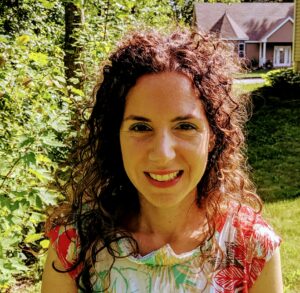ASLE’s Scholar of the Month for May 2023 is Danila Cannamela.
Danila Cannamela is an Assistant Professor of Italian Studies in the Department of French and Italian at Colby College. Her research interests include pastoral ecopoetics and the crossroads of environmental humanities, feminist theory, and transgender studies. Her first book, The Quiet Avant-Garde: Crepuscular Poetry and the Twilight of Modern Humanism (2019), examines the precursory role of the crepuscular poetics of the object in repositioning the human and the nonhuman in an anti-hierarchical relation. She has co-edited Italian Trans Geographies (forthcoming in 2023), a book that retraces stories of trans people within the Italian peninsula and across diasporic routes. Danila is also co-editing a special issue of Rivista di Studi Italiani titled “Climate for Poetry/Poetry for Climate.” Her articles have appeared in several peer-reviewed journals, including Journal of Modern Italian Studies, Forum Italicum, ISLE: Interdisciplinary Studies in Literature and Environment, MLN: Modern Language Notes, and Modernism/modernity.
How did you become interested in studying ecocriticism and/or the environmental humanities?
When I was finishing my Ph.D. at the University of North Carolina at Chapel Hill, ecocriticism, and more broadly the environmental humanities, were a rather new field of research in Italian Studies and became a great laboratory of vibrant new ideas and approaches to teaching Italian culture. I still have a vivid memory of the 2013 AAIS conference (one of the annual conferences in Italian Studies), in which Rosi Braidotti was the guest speaker. She prompted the audience to look at the image of the Vitruvian man and then asked to rethink that iconic image of Italian culture as a woman or as an animal. That exercise was a pivotal moment in my understanding of the potential that the environmental humanities have in envisioning the human, the nonhuman, and their relational space beyond taken-for-granted hierarchies and binaries.
Who is your favorite environmental artist, writer, or filmmaker? Or what is your favorite environmental text? Why?
I have great admiration for the work of British ecopoet Helen Moore (https://www.helenmoorepoet.com/). A couple of years ago, I had the opportunity to translate a selection of her poems into Italian for the website Zest (https://www.zestletteraturasostenibile.com/). My translation work led to a collaborative project for a new class on ecopoetry that I recently taught at Colby College. The class features a comparative perspective: discussions of Italian and English poems and ecocritical theories are mixed with the exploration of a “wild writing” practice. Helen (who also speaks Italian) led a series of writing workshops that helped students develop personal ecopoetic responses while connecting with sites in rural Maine. What I appreciated the most about Helen’s work with my students was her ability to “translate” their experience of encountering poetry as readers into a lived practice. Engaging in the practice of writing ecopoetry enabled them to think of and feel with their surrounding environment. In the workshops, they have experienced earth as their broader body, felt environmental grief, and cultivated joyful curiosity for the change that they can still enact.
What are you currently working on?
I am working on a new book project on the pastoral landscape, based on an Environmental Humanities Lab that I taught in 2021 at Colby College. The class investigates the idea of the pastoral as a “comfort food recipe” rooted in the classical tradition, whose simple ingredients have inspired sophisticated “cooking techniques” and contemporary reinventions. Students explored four ingredients—milk, root vegetables, meat, and honey—through literary and visual texts, and theories in the environmental humanities. In the meantime, they engaged in experiential learning by visiting organic farms in Central Maine. The outcome of this semester-long research was a cookbook in which recipes and stories from the farms were connected with ancient and contemporary narratives of pastoral landscapes. Designing and teaching this class spurred many ideas on how to creatively re-engage with the bittersweet flavors of the pastoral and turn this classic “recipe” into a site of environmental investigation in the present.
What is something you are reading right now (environmental humanities-related or otherwise) that inspires you, either personally or professionally? Comment briefly on why or how it inspires you.
At times, in academia, we forget that reading can be fun! I have been listening to English cli-fi novels while taking walks. And, of course, this enjoyable activity has inspired my research on Italian cli-fi works authored by women (e.g., Gilda Musa, Clelia Farris, Nicoletta Vallorani, Laura Pugno, and Alda Teodorani). I have been analyzing how these writers have redeployed the “old-fashioned” theme of love into an environmental narrative. Through their exploration of love, they have encouraged a shift away from the dominant thinking about the environmental crisis: the solution—they seem to suggest—may reside not so much in speculating about green energy and green economy but in envisioning human and cross-species relationships that prioritize joyful sharing, (self-)acknowledgment, and consensual pleasure.
Is there a scholar in the field who inspires you? Why?
Undoubtedly, the scholar that has inspired me the most is Serenella Iovino. Her approach to Italian Studies and material ecocriticism, her way of analyzing the landscape as storied matter, and her clarity of thought have informed my approach to the environmental humanities. Besides Iovino, I have great admiration for scholars who work at the intersection of feminism, queer studies, and environmental humanities—and this includes Greta Gaard, Carol Adams, Stacy Alaimo, Nicole Seymour, and Alexis Pauline Gumbs. Finally, Robin Wall Kimmerer and her environmental elaboration on the notions of reciprocity and gratitude have also guided my work.
